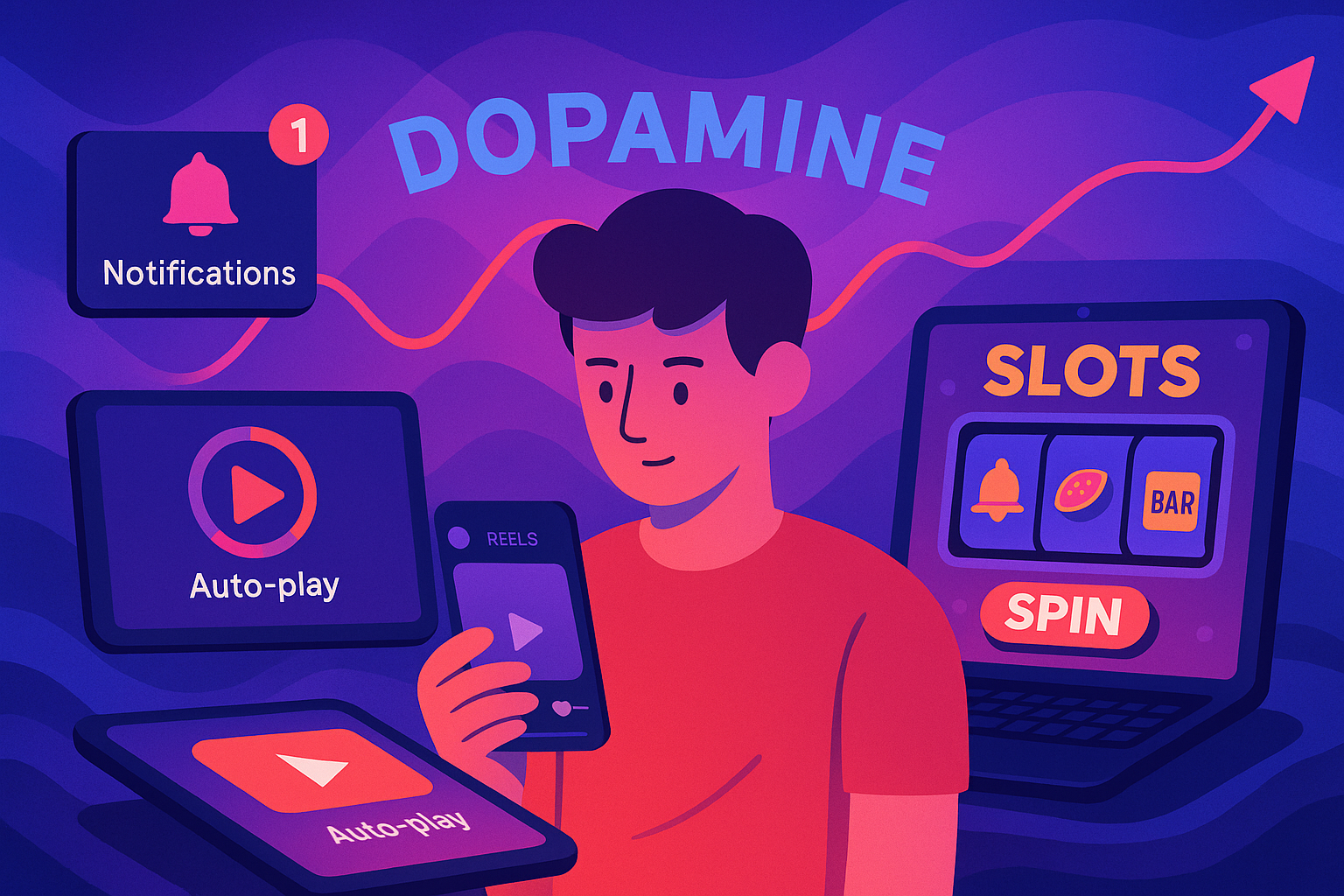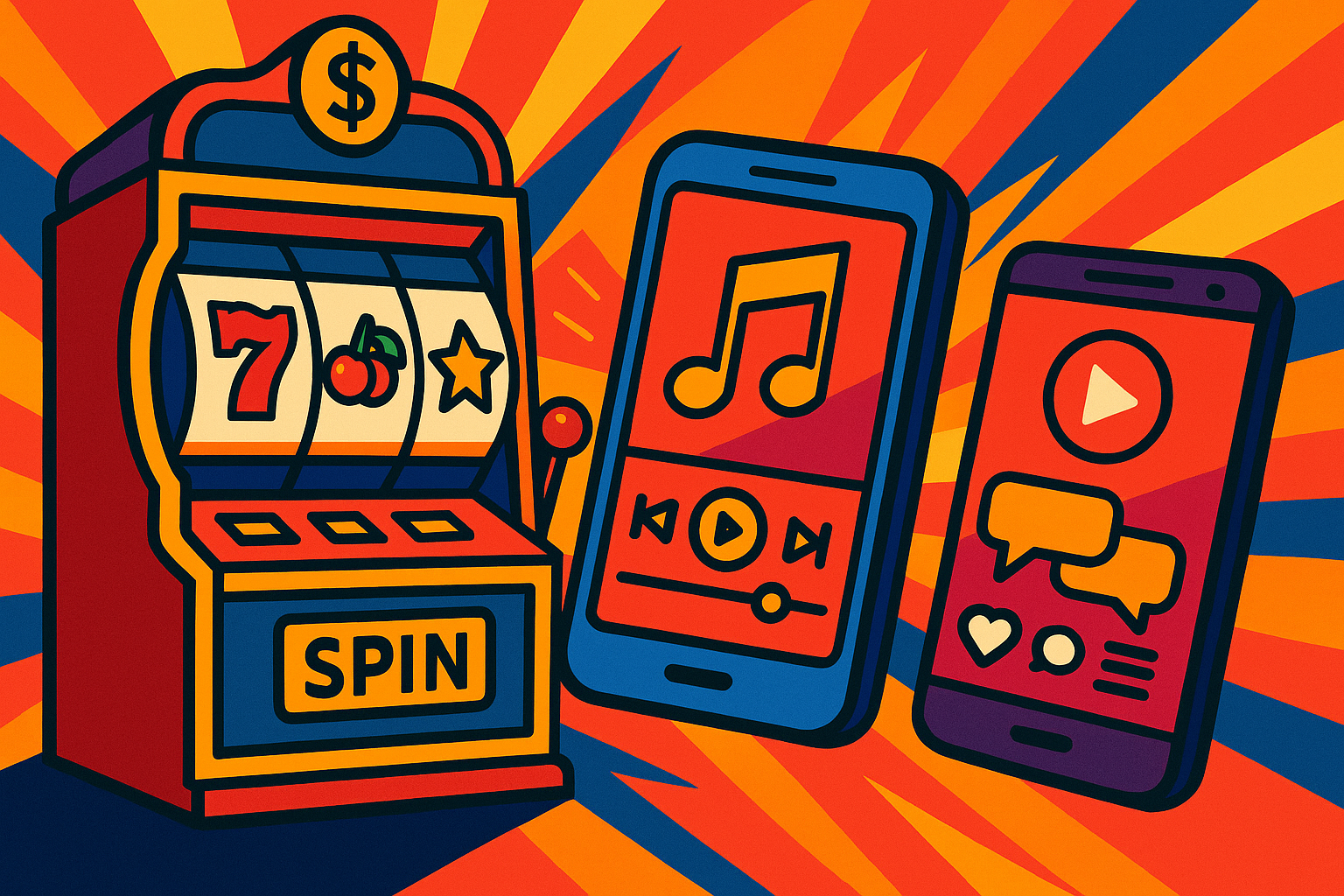From TikTok loops to slot reels, modern entertainment is using the same tricks — and it’s working.
You check your phone in the elevator. You scroll while waiting for your flat white. Not because you need anything — but because you crave that tiny hit of something. A sound, a flash, a surprise. Something that sparks. That’s dopamine.
We used to think of entertainment as a break from life. Now it’s more like a precision mechanism — a stimulus-response loop built to keep our brains dialled in. And it works. The question is: who’s in control — you, or your screen?
The Casino Industry Figured This Out Long Before Everyone Else
Years before TikTok cracked the code of infinite scroll, online casinos were already fine-tuning dopamine timing.
Here’s how it works:
- Bright visual rewards after every spin
- Carefully timed "near misses" to build anticipation
- Sounds engineered to mimic the jingles of small victories
- Daily rewards, lucky wheels, “spin again” bonuses
This wasn’t accidental. These features are the result of behavioural design, not aesthetics. It’s the same logic you see in mobile games and streaming platforms now: short loops, immediate feedback, and constant unpredictability.
Modern casino platforms borrow heavily from game design. Slot interfaces often look like arcade games, with characters, levels, bonus rounds. There’s even a push toward live-streamed games with real hosts and chat functions — the same dynamic you'd find on Twitch, but with stakes.
A great example is 7 bit casino, which blends retro arcade aesthetics with modern crypto features. It offers a library of slots that look and feel more like pixel art games than traditional gambling, with fast-paced mechanics and curated visual design.
Some crypto-based platforms now offer “provably fair” mechanics using blockchain, targeting those who want transparency in randomness. Others collaborate with visual artists to design slots that feel more like interactive digital installations than gambling.
Like it or not, the casino industry helped write the playbook for today’s attention-driven interfaces.

Entertainment Is Now Engineered to Stimulate, Not Just Distract
TikTok delivers bursts of novelty every few seconds. One swipe — new face, new sound, new tone. And just when you're ready to exit, something unexpected pulls you back in.
Spotify curates your mood on the fly. Netflix keeps episodes rolling before you even have time to reconsider. Instagram inserts reels mid-scroll based on milliseconds of hesitation.
And this isn’t just a global trend — it’s showing up in Australia too. Local regulators have voiced concern about mobile games that blur the line between entertainment and gambling, especially those targeted at younger users.
It’s not about content quality. It’s about timing, pattern, and the illusion of control. You’re not choosing. You’re reacting.
UX Design Is Now a Science of Emotional Design
Modern interfaces aren’t just “user-friendly” — they’re emotionally calibrated.
Casino designers have used this logic for decades:
- Colour palettes that stimulate excitement
- Sound design that mimics reward feedback
- Delays and animations that build anticipation
- Progress indicators that simulate mastery
Today, the same thinking shows up everywhere:
– Language learning apps give XP streaks and celebration sounds
– Fitness trackers reward you with badges and graphs
– Even mental wellness apps offer “daily goals” and visual feedback
We’re not just interacting with apps — we’re being guided through carefully designed emotional pathways. And the goal is always the same: keep you engaged just long enough to trigger another round.

Micro-Hits Are the New Currency of Fun
Long-form immersion is out. Short bursts of reward are in.
Mobile games hand out daily bonuses. Social apps notify you the second someone interacts. Even news platforms now offer “streaks” for reading two articles in a row.
Online casinos operate the same way:
- Fast spin cycles
- Free bonus rounds every few minutes
- Pop-up gifts for returning
- Time-limited promotions and surprise wins
Players are often drawn in by structured reward systems that offer multiple stages of gratification — not just one big prize, but a rhythm of small, consistent incentives.
This breakdown of 7bit Casino’s bonus https://7bitcasino8au.com/bonuses/ offerings shows how that structure works in real-time — encouraging engagement through a mix of welcome rewards, reload perks, and progressive incentives.
It’s not gambling in the old sense — it’s engineered stimulation. And it’s bleeding into everything, from shopping to dating apps. Swipe, match, reward.
When It Starts Working Against You
The more often you get dopamine without effort, the harder it becomes to focus on anything that doesn’t offer instant gratification.
Books feel slow. Conversations feel flat. Real life feels... muted.
And yes, there’s data behind this. Research links overuse of short-form content to attention fatigue, anxiety, and difficulty maintaining focus.
When entertainment is always available, restlessness becomes the baseline.
Some platforms are adapting. PlayOJO, for example, positions itself as a “fair casino” — no wagering traps, built-in spending caps, and automatic alerts if you’ve been playing too long.
In Australia, the Australian Communications and Media Authority (ACMA) continues to crack down on offshore casino operators while promoting clearer consumer protections.
It’s not a revolution. But it’s a start.
So, What Now?
Dopamine isn’t the enemy. It’s just a signal. A nudge that says, “This might be good.”
The problem? We’ve stopped asking what’s actually good — and just keep chasing the nudge.
Entertainment’s changed — and so has our relationship to it. It’s not about quitting screens or rejecting fun. It’s about recognising the slot machine in your pocket — and deciding when to spin, and when to stop.
In a culture built on grabbing your attention, clarity is the new resistance.







